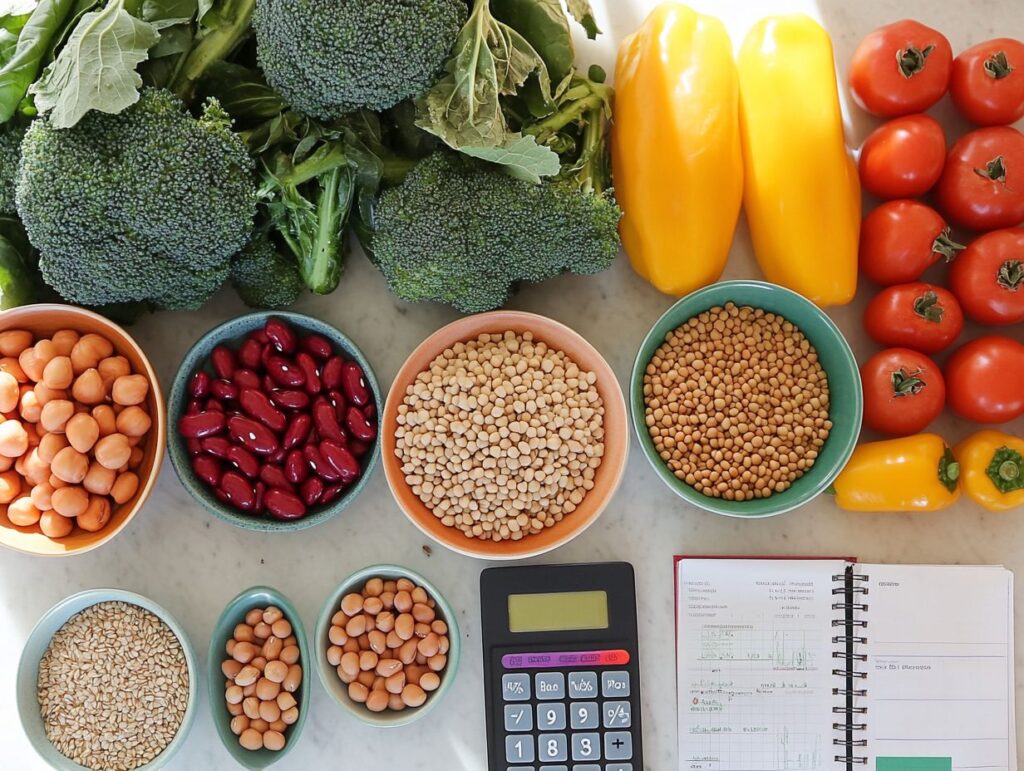Considering the adoption of a plant-based diet but concerned about budget constraints? You are not alone in this regard. Many individuals hold the misconception that maintaining a healthy, plant-based diet necessitates significant financial expenditure; however, this is not the case.
This article examines the various health and financial advantages of a plant-based diet, offers practical strategies for effective meal planning and smart shopping, and identifies budget-friendly sources of protein along with appealing recipes.
With a degree of creativity and careful planning, it is indeed possible to enjoy nutritious and satisfying meals while remaining within a reasonable budget.
Table of Contents
Key Takeaways:
- Adopting a plant-based diet can have both health and financial benefits, making it an ideal option for those looking to save money while improving their overall wellbeing.
- With proper planning and budgeting, it is possible to enjoy delicious and nutritious plant-based meals without breaking the bank. Meal planning and utilizing affordable protein sources are key strategies for staying on budget.
- Don’t let a tight budget discourage you from trying a plant-based lifestyle. With budget-friendly recipes and motivation to stay on track, you can successfully incorporate more plant-based meals into your diet without overspending.
What is a Plant-Based Diet?

A plant-based diet primarily comprises foods derived from plants, including vegetables, fruits, grains, legumes, nuts, seeds, and plant-based products such as tofu, tempeh, and almond milk. This dietary approach closely aligns with veganism, which advocates for the exclusion of all animal products. It is recognized for its health benefits and its potential to mitigate animal exploitation and reduce environmental impact.
By emphasizing nutritious food options, individuals can enhance their health while also making more ethical food choices.
Adopting this lifestyle entails incorporating a diverse array of flavors and textures into meals, resulting in a vibrant culinary experience. Staples such as whole grains provide essential fiber, while legumes are abundant in protein and iron, facilitating the fulfillment of nutritional requirements without reliance on meat.
The health advantages of a plant-based diet are supported by numerous studies, which indicate a lower risk of chronic diseases such as heart disease, diabetes, and certain types of cancer. Transitioning to a plant-based diet can significantly reduce an individual’s carbon footprint, as the production of plant foods typically demands fewer natural resources compared to livestock farming.
Embracing this dietary choice fosters both personal well-being and environmental sustainability.
Benefits of Eating Plant-Based on a Budget
Adopting a plant-based diet on a budget presents a range of advantages that extend beyond mere financial savings. It fosters a healthier lifestyle, diminishes healthcare expenses related to chronic diseases such as heart disease, diabetes, and cancer, and substantially decreases environmental impact by reducing dependence on animal exploitation.
As an increasing number of individuals pursue affordable yet nutritious food options, the vegan community is flourishing, promoting intelligent shopping practices and effective meal planning to optimize health benefits while minimizing costs.
Health and Financial Benefits

Adopting a plant-based diet not only contributes to a healthy lifestyle but also results in significant financial savings, particularly when evaluating the long-term reduction in healthcare costs associated with chronic illnesses such as heart disease, diabetes, and cancer.
By prioritizing nutritious foods, including grains, legumes, and fresh vegetables, individuals can enhance their overall well-being while taking advantage of cost-effective meal options.
This approach extends beyond personal health benefits; it also has the potential to positively influence public health systems by decreasing the prevalence of diet-related diseases.
By making healthier food choices, individuals can lower their risk of developing conditions that necessitate expensive medical interventions and ongoing treatment.
Emphasizing plant-based foods often entails purchasing seasonal and locally grown produce, which can further decrease grocery expenses.
As more individuals adopt these dietary preferences, the likelihood of reduced healthcare costs becomes a collective advantage, underscoring the interconnected relationship between diet, health, and financial well-being.
How to Plan and Shop for Plant-Based Meals on a Budget
Effectively planning and purchasing plant-based meals on a budget necessitates strategic meal planning, prudent shopping practices, and a thorough understanding of seasonal produce and grocery store promotions.
By developing a comprehensive grocery list and taking advantage of bulk purchasing options, individuals can reduce food waste and achieve cost savings while enjoying a varied selection of nutritious plant-based foods, including convenient frozen options for meal preparation.
Meal Planning and Budgeting Tips

Effective meal planning and budgeting necessitate the creation of a comprehensive grocery list to guide shopping efforts, ensuring that only essential items are purchased, thereby reducing food waste. By incorporating affordable recipes into the weekly menu and employing strategic shopping techniques, individuals can enjoy a diverse array of delicious plant-based meals while remaining within their budget.
To begin, it is advisable to plan meals that utilize similar ingredients to minimize excess and streamline the preparation process. When drafting the grocery list, organizing it by category—such as produce, grains, legumes, and so forth—can facilitate a more efficient shopping experience.
It is also beneficial to seek out seasonal fruits and vegetables, which are often more affordable and provide greater freshness and flavor. Including versatile staples, such as rice, beans, and seasonal vegetables, allows for creative culinary exploration without placing undue strain on financial resources.
Additionally, one should not overlook local farmers’ markets or discount grocers, which frequently offer excellent deals on high-quality produce, benefiting both the pantry and the budget.
Budget-Friendly Plant-Based Protein Sources
Identifying cost-effective plant-based protein sources is crucial for sustaining a nutritious diet, particularly through the inclusion of staples such as beans, legumes, grains, tofu, and tempeh in meals.
These protein-rich foods are not only economical but also versatile, enabling the preparation of a diverse array of delicious recipes that accommodate various budgets while promoting a healthy lifestyle.
Affordable and Nutritious Options

Affordable and nutritious options for plant-based proteins encompass a diverse array of beans, legumes, grains, tofu, and tempeh, each contributing distinct flavors and health benefits. By integrating these ingredients into your meals, it is possible to prepare satisfying dishes that are budget-friendly while ensuring the intake of essential nutrients.
For example, lentils are abundant in protein and fiber, rendering them ideal for hearty soups or appealing salads.
- Black beans, known for their high antioxidant content, can enhance a simple rice bowl or serve as a filling for tacos.
- Whole grains such as quinoa contain all nine essential amino acids and can serve as an excellent base for grain salads or vegetable burgers.
- Tofu, which readily absorbs flavors, can be marinated and stir-fried with ease.
- Tempeh’s nutty flavor profile makes it suitable for stir-fries or sandwiches.
Incorporating these plant-based proteins not only promotes heart health but also fosters sustainable eating practices.
Budget-Friendly Plant-Based Meal Ideas
Developing budget-friendly plant-based meal ideas can be both enjoyable and fulfilling, providing an opportunity to discover a variety of affordable recipes that are simple to prepare at home.
By emphasizing the use of seasonal produce and leveraging pantry staples, individuals can create nutritious meals that are both economical and satisfying, while also enjoying homemade snacks that promote sustained energy throughout the day.
Delicious and Affordable Recipes
Delicious and affordable plant-based meal recipes can be easily crafted by combining seasonal produce with budget-friendly staples, resulting in dishes that are both nutritious and economical. From hearty grain bowls to flavorful bean salads, these recipes are ideal for individuals seeking to maintain a healthy diet without incurring excessive costs.
By utilizing fresh, in-season vegetables, such as vibrant squash in the fall or crisp greens in the spring, one can enhance culinary creations and infuse them with rich flavors. Simple, easy-to-follow techniques facilitate the preparation of delightful meals in minimal time, ensuring that home cooking remains an enjoyable experience.
Incorporating pantry staples like lentils, quinoa, and chickpeas allows for maximum versatility and creativity in the kitchen. With a touch of imagination, it is possible to prepare fulfilling dishes that accommodate a variety of tastes and dietary preferences.
Staying on Track with Plant-Based Eating on a Budget
Maintaining a plant-based diet on a budget necessitates dedication and a conducive environment, which is often provided within the vegan community.
By setting clear objectives, planning meals in advance, and being conscious of food waste, individuals can uphold their dietary choices while deriving motivation from shared experiences and available resources.
Troubleshooting and Staying Motivated
Addressing the challenges encountered while adhering to a plant-based diet on a budget necessitates the identification of potential barriers and the pursuit of solutions within the supportive vegan community. Maintaining motivation can be facilitated through engagement with others, the sharing of experiences, and the exploration of new cooking techniques, which collectively aid in minimizing food waste and promoting a healthy lifestyle.
Common challenges include:
- The perception that plant-based foods are more costly
- The lack of variety
- The difficulty in locating affordable ingredients
Many individuals may feel overwhelmed by the vast array of options available and uncertain about how to begin their journey.
To surmount these obstacles, individuals can prioritize seasonal produce and bulk purchases of staples such as grains and legumes, thereby ensuring a diverse range of meal options without incurring excessive costs.
Participating in community groups or online forums focused on plant-based lifestyles not only provides essential support but also grants access to valuable tips and recipes. This engagement enhances motivation and cultivates a sense of belonging among individuals with similar interests.
Learn more, checkout Budget-Friendly Plant-Based Meals.









